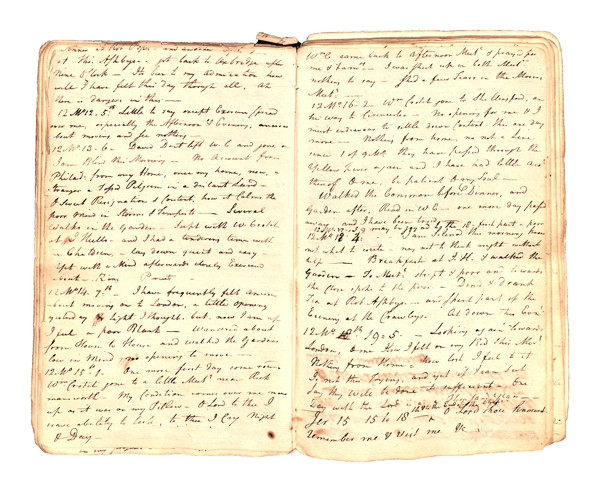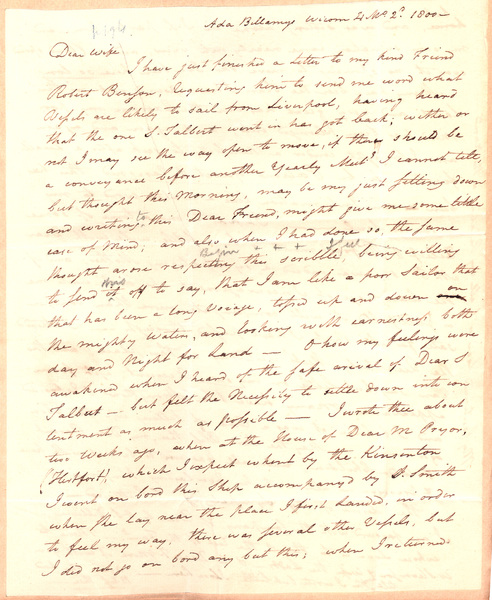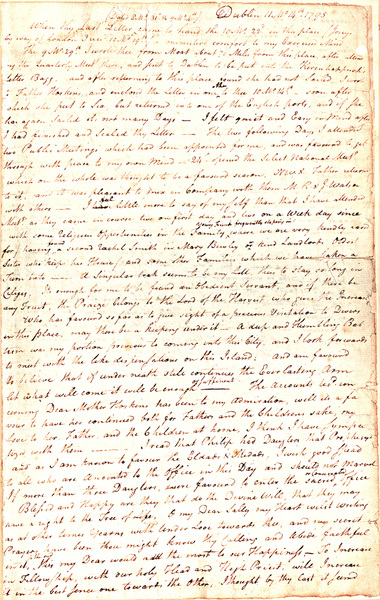Letters
Letter writing, like scrawling in a journal, is a private form of communication. While it was more common during Scattergood’s lifetime to share the contents of one’s letter with others, they convey a sense of intimacy. Even the format of a letter encourages and produces intimacy, such as the standard expressions "Dear" and "Sincerely." Sometimes sections of a letter were kept private upon instruction and others were explicitly requested to be shared. Letters attempt to fulfill certain expectations of manners and conformity, perhaps not unlike what Imbarrato noticed about societal conformity in journal writing. Especially as he made plans to return to the United States, Scattergood received several letters wishing him safe travels and future peace and happiness; his melancholic spirit was noticed by the Friends he met abroad.
In these letters we see a more open portrayal of Thomas Scattergood, one that he presented to his loved ones. Scattergood’s letters allowed him to project and reinforce his self-image. They also made it possible for him to maintain relationships with his wife, mother and children for over six years. It would seem that letters in part enabled Scattergood’s journey when he had responsibilities at home. However, as seen in his journals, one sees the limitations in feeling connected through letter writing.
In this passage, an absence of letters from home leads Scattergood to feel further distanced from his family. Philadelphia begins to feel foreign. To an extent letters helped Scattergood connect with his loved ones; he found out about deaths, in particular the death of his daughter Mary and his mother, the return of Yellow Fever to Philadelphia, marriages and others' spiritual journeys. As he moves from house to house, when he does not have letters from home to ground him, Scattergood feels himself more and more the "tossed Pilgrim."
Scattergood repeats many of the sentiments he records in his journals: he has cried many tears in England, his mind has endured persistent suffering, and he constantly seeks to be, "Patient, quiet, & resigned." He also mentions feeling refreshed and relieved after visiting with "Dear M.P.," with whom, "if the Language of Incouragement she drop unto me is fullfilled, it will compensate, more than compensate for all that I have passed through..." Language then serves as an explicit source of support and recompense for Scattergood's trials. As this letter is addressed to his wife, Scattergood's words are not just for himself but for her as well; in writing this letter Scattergood reinforced his language of validation to himself and Sarah.
Thomas gives his wife Sarah an account of the numerous meetings he has visited and people he has spoken to. While his daily journal allows him to do so already, Scattergood reinforces the record of his travels in writing about them to his wife, which becomes a rewriting. He also mentions news that he has heard in another letter, that a man named Philip had daughters who prophesied. He then makes mention of "Eldad and Medad," two men from the book of Numbers who were said to have been gifted with the ability to prophesy. Prophesy is a communication of God's will through the body of another person; to have the gift of prophesy is to be a medium of God's voice or will.
In letter writing, it is possible to disseminate information, such as the message of a dream or prophesy, to a broader audience. However, while information may be circulated, it is rendered into a form that is quite different from its original communication. So although letter writing is a source of comfort and connection, there are circumstances in which the communication falls short.


